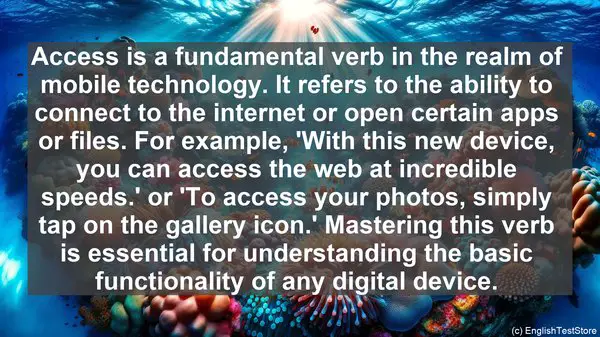Introduction: The Importance of Verbs in Conversations
When it comes to conversations, verbs play a crucial role. They are the action words that bring life to our sentences. In the context of mobile technology and connectivity, having a strong verb vocabulary is essential. It enables us to describe actions, express opinions, and ask questions effectively. Today, we’ll explore the top 10 verbs that will empower you in discussions on this topic. Let’s get started!
1. Access: The Gateway to Digital World
Access is a fundamental verb in the realm of mobile technology. It refers to the ability to connect to the internet or open certain apps or files. For example, ‘With this new device, you can access the web at incredible speeds.’ or ‘To access your photos, simply tap on the gallery icon.’ Mastering this verb is essential for understanding the basic functionality of any digital device.
2. Update: Keeping Things Current
In the fast-paced world of technology, updates are frequent. This verb signifies the process of installing the latest software or firmware to ensure optimal performance and security. For instance, ‘It’s important to regularly update your operating system to benefit from new features.’ or ‘The app developer released an update to address some bugs.’ Being familiar with this verb is vital for device maintenance.
3. Sync: Harmonizing Across Devices
Sync, short for synchronization, is about aligning data or settings across multiple devices. It’s often used in the context of contacts, calendars, or files. For example, ‘By enabling sync, your contacts will be available on all your devices.’ or ‘Make sure to sync your work files to the cloud for easy access.’ Understanding this verb ensures seamless integration in the digital ecosystem.
4. Stream: Enjoying Content in Real Time
With the rise of streaming platforms, this verb has gained immense popularity. It refers to the continuous playback of audio or lesson content over the internet without the need for downloading. For instance, ‘You can stream your favorite songs on this app.’ or ‘The movie will be available to stream from tomorrow.’ Knowing this verb is essential for entertainment enthusiasts.
5. Troubleshoot: Resolving Technical Issues
When things go wrong with our devices, this verb comes into play. Troubleshooting involves identifying and fixing problems. For example, ‘If your phone freezes, try these steps to troubleshoot the issue.’ or ‘The support team is trained to troubleshoot network connectivity problems.’ Mastering this verb is crucial for self-reliance in the digital world.

6. Optimize: Enhancing Performance
Optimize is about making something as efficient or effective as possible. In the context of mobile technology, it often refers to improving battery life, network speed, or app performance. For instance, ‘Closing unused apps can optimize your device’s battery usage.’ or ‘The software update is expected to optimize network connectivity.’ Understanding this verb helps in maximizing device potential.
7. Customize: Tailoring to Your Preferences
One of the advantages of modern technology is the ability to customize settings or interfaces. This verb signifies personalization. For example, ‘You can customize the home screen by rearranging app icons.’ or ‘The app offers various themes to customize the appearance.’ Being familiar with this verb allows users to make their devices truly their own.
8. Share: Collaborating and Spreading Information
Sharing is a verb that’s at the core of social interactions in the digital age. It’s about distributing content, whether it’s a photo, document, or link. For instance, ‘You can share the presentation with your team via email.’ or ‘The social media platform allows users to share posts with their followers.’ Mastering this verb is essential for effective communication and collaboration.
9. Backup: Safeguarding Important Data
Data loss can be devastating. That’s where the verb backup becomes crucial. It means creating a copy of important files or information as a precaution. For example, ‘Make sure to regularly backup your photos to the cloud.’ or ‘The software offers an automatic backup feature.’ Understanding this verb ensures peace of mind when it comes to data security.
10. Navigate: Finding Your Way in the Digital World
In the vast digital landscape, navigation is essential. This verb refers to the process of moving through menus, websites, or apps to find what you’re looking for. For instance, ‘To change the settings, navigate to the options menu.’ or ‘The website has a user-friendly interface, making it easy to navigate.’ Mastering this verb is vital for efficient digital exploration.

